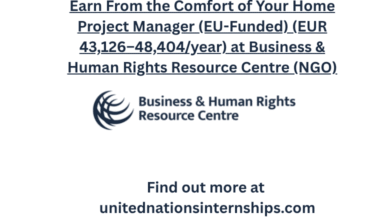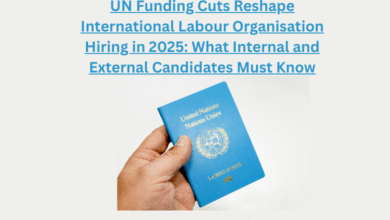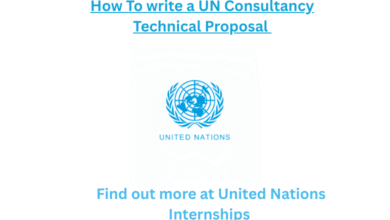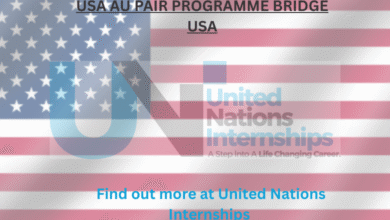2025 UN Technical Proposal Writing Made Simple Example from a Data Visualization Consultancy
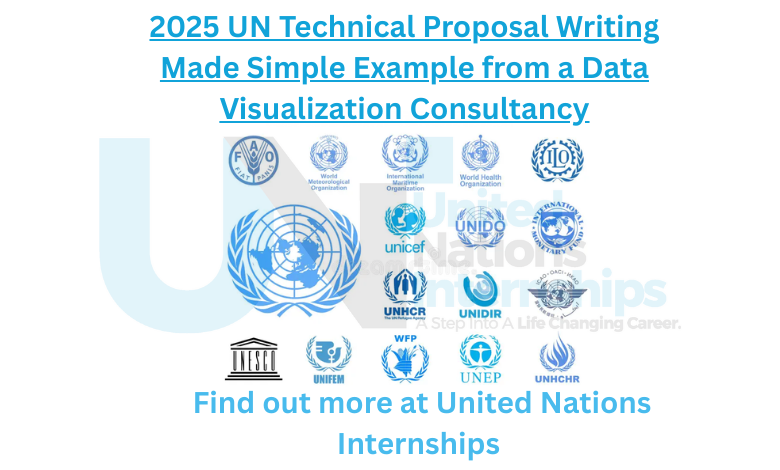
2025 UN Technical Proposal Writing Made Simple Example from a Data Visualization Consultancy
In our last article (2025 Your Technical Proposal as a Passport to UN Consultancy), we unpacked what a UN technical proposal is, why it matters, and how to structure one for success. Many of you asked: “Can we see a real example?”
This follow-up delivers just that. Below is a sample technical proposal crafted from a current UN consultancy opportunity: Data Visualization and Analytics Consultant (Port-au-Prince, Haiti).
This example shows how to turn Terms of Reference (ToR) into a convincing, professional document. It’s meant as a guide only every applicant must tailor their proposal to their own skills, experience, and the specific ToR requirements.
TECHNICAL PROPOSAL
Consultancy: Data Visualization and Analytics Consultant
Duty Station: Port-au-Prince, Haiti
Duration: 4 months (with possible extension)
0. Executive Summary
This consultancy is designed to strengthen Government–UN–IFI coordination in Haiti by establishing a robust multi-source data platform, developing predictive analytics models, and producing accessible visualizations for joint planning and decision-making.
The proposed methodology adopts a phased approach: inception and platform adaptation, data integration and quality assurance, visualization and predictive analytics, and validation with knowledge transfer.
Key deliverables include ETL data pipelines, interactive dashboards, predictive foresight models, and tailored capacity-building workshops for Government and UN staff.
The proposal emphasizes rigor, inclusivity, and sustainability: triangulating multiple data sources, applying machine learning for foresight, and ensuring outputs are user-friendly for policymakers. The consultant’s comparative advantage lies in combining technical expertise (Python, R, Power BI, Tableau, QGIS) with multilateral coordination experience, ensuring both innovation and institutional alignment.
1. Understanding of the Assignment
The consultancy, as outlined by the UN Resident Coordinator’s Office (RCO) in Haiti, seeks to strengthen Government–UN–IFI coordination through enhanced data-driven analysis and visualization. This work is critical to the implementation of two strategic processes:
- The Rapid Crisis Impact Assessment (RCIA), led by the Government with support from the World Bank, UN, EU, and IDB.
- The Recovery and Development Plan 2025–2030, launched in April 2025 under IDB’s technical coordination.
The Consultant understands that the assignment’s primary objective is to design, adapt, and operationalize a multi-source data platform, ensuring real-time analytics, predictive modelling, and accessible data visualizations. This will directly contribute to evidence-based decision-making, resource allocation, and joint planning across humanitarian, development, and peace priorities in Haiti.
The Consultant’s experience in data science, visualization, and UN-system coordination provides the foundation to deliver robust, user-friendly analytical tools and strengthen cross-institutional cooperation in line with UN 2.0 and SDG 17 targets.
2. Methodology and Approach
The Consultant proposes a phased and systematic approach to deliver on the assignment’s objectives:
Phase 1: Inception and Platform Alignment (Weeks 1–2)
- Contextual Review: Assess existing data sources, architectures, and coordination mechanisms (UN agencies, IFIs, Government).
- Workplan Development: Finalize a detailed workplan with timelines, responsibilities, and outputs.
- Platform Alignment: Collaborate with RCO and technical partners to adapt the multi-source platform’s architecture to the Haitian context.
Phase 2: Data Collection, Integration, and Quality Assurance (Weeks 2–6)
- Data Integration: Develop automated ETL workflows to ingest structured/unstructured data from national and international partners.
- Governance Protocols: Establish metadata standards, interoperability rules, and data validation processes.
- Data Cleaning: Ensure data consistency, accuracy, and reliability through cross-verification with source agencies.
Phase 3: Visualization, Analytics, and Dissemination (Weeks 3–10)
- Visualization Products: Design interactive dashboards, infographics, and spatial maps using Power BI, Tableau, QGIS, and D3.js.
- Automated Outputs: Produce routine briefs, alerts, and dashboards for situational awareness and coordination platforms.
- Predictive Modelling: Apply machine learning and statistical methods (e.g., regression, clustering, random forests) to produce foresight models.
- Capacity-Building: Train RCO staff and Government clerks on data use, analytics, and visualization.
Phase 4: Validation, Reporting, and Knowledge Transfer (Weeks 11–16)
- Data Validation: Conduct consultations with Government, UN, and IFIs to cross-check results.
- Final Deliverables: Prepare a consolidated dataset, validated dashboards, predictive models, and a synthesis report.
- Presentation: Deliver a final debrief to stakeholders with actionable recommendations.
3. Quality Assurance and Risk Mitigation
The Consultant commits to maintaining high standards through:
- Continuous Liaison with RCO: Weekly updates to ensure alignment with RCO priorities.
- Triangulation of Data: Using multiple data sources to enhance accuracy.
- Risk Mitigation Strategies:
- Non-responsiveness: Leverage UN/IFI networks and official channels for data access.
- Data Gaps: Document limitations transparently while proposing alternative proxies.
- Timeline Pressures: Maintain a realistic schedule with buffer periods.
4. Timeline (4 Months)
| Month | Activities | Deliverables |
|---|---|---|
| 1 | Inception, stakeholder consultations, platform adaptation | Inception Report, refined workplan |
| 2 | Data integration, ETL workflow design, metadata standards | Cleaned datasets, draft dashboards |
| 3 | Predictive modelling, automated reporting, training sessions | Predictive models, interim dashboards |
| 4 | Validation, synthesis report, final debriefing | Final dashboards, report, datasets, training materials |
5. Relevant Experience and Comparative Advantage
The Consultant brings a strong track record in:
- Data Science and Visualization: Proficiency in Power BI, Tableau, Python, R, SQL, and QGIS.
- Predictive Analytics: Experience in developing foresight models for crisis monitoring and recovery planning.
- Multilateral Coordination: Supporting UN, IFIs, and governments in fragile and crisis contexts.
- Policy-Oriented Outputs: Proven record of producing high-impact dashboards, briefs, and reports for decision-makers.
- Cloud Data Management: Experience with AWS, Azure, and GCP for scalable data solutions.
- Capacity Building: Training government and UN staff on data integration, analytics, and visualization.
6. Tools and Resources
The Consultant will employ:
- Software & Platforms: Tableau, Power BI, Python (Pandas, TensorFlow, Scikit-learn), R, SQL, QGIS.
- Infrastructure: Cloud platforms (AWS/Azure/GCP) for data hosting and integration.
- Professional Networks: Access to UN, IFI, and government stakeholders for data sharing.
- Knowledge Resources: Documentation from RCIA, Recovery Plan, and other crisis-response frameworks.
7. Conclusion
The Consultant possesses the required technical expertise, UN/IFI experience, and commitment to capacity-building to successfully deliver this assignment. By combining robust data integration, advanced analytics, and accessible visualizations, the consultancy will enable the UN RCO in Haiti to foster evidence-based, joint decision-making and advance the objectives of the RCIA and the Recovery & Development Plan 2025–2030.
- Step Into the Heart of U.S. Foreign Policy: Apply for the International Affairs Fellowship (IAF) ($120,000 stipend)
- Pursue Your Scholarly Vision: NEH Fellowships Offering Up to $60,000 for Humanities Research
- From Application to Interview: 4 Insider Hacks for UN/INGO Jobs (with Ready to Use Templates) for use in 2025
- Earn From the Comfort of Your Home Project Manager (EU-Funded) (EUR 43,126–48,404/year) at Business & Human Rights Resource Centre (NGO)
- 5 Funded UNV Roles Open Now (Oct 2025): Why UN Funding Cuts Make Paid UN Volunteering Your Smartest Move

